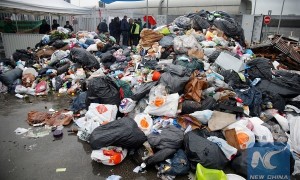China's stock market has come to a stage where those who long the market and those who short it can both be justified to defend their stance.
The benchmark Shanghai Composite Index fell by 1.6 percent on Monday to come close to the psychological mark of 2000 points. It has slumped by nearly 7 percent since April 10.
Whether it rallies or continues to fall on Tuesday, therefore, would not change the fact that it is in a downward cycle. Any short-term rallies would not bail it out if China's economic fundamentals remain weak.
Economic fundamentals are a barometer of the stock index, although the gauge with Chinese characteristics is not always sensitive in this market.
In the immature stock market, which is fraught with irregularities ranging from insider trading to porous IPO procedures, China's economic booms may not be fully reflected in the stock index changes.
But whenever the economy loses its steam and becomes slower in expansion, the stock index has seldom failed to follow suit.
Admittedly, those who long the market have ample reasons to support their stance.
Policymakers are racking their brains to boost the economy. The recent policies include renewed investment in infrastructure, shanty town rebuilding, tax cuts and opening of the monopoly sectors to private investors.
The International Monetary Fund has raised its forecast of China's GDP growth by 0.3 percentage point to 7.5 percent for 2014. It serves as a shot in the arm of those who remain optimistic toward the growth prospects of the world's second-largest economy.
Technically, the MSCI China index shows Chinese stocks are traded at about 8.8 times 12-month forward earnings, a near 27 percent discount to its long-term average of 12 times, securities firm Nomura said.
Some stocks have had very low price-earnings ratios from a historical perspective. The banks are traded at less than 5 times earnings, a more than 50 percent discount to long-term averages, while property shares are at 6 times, a more than 40 percent discount, the Nomura data show.
Some stocks have had very low price-earnings ratios from a historical perspective. The banks are traded at less than 5 times earnings, a more than 50 percent discount to long-term averages, while property shares are at 6 times, a more than 40 percent discount, the Nomura data show.
When those indicators have become unprecedentedly low, supposedly the stock market will start to bottom out.
Still, the economic fundamentals remain weak, either seen from the recent Purchasing Managers' Index prints or GDP figures. Despite the recent mini-stimulus measures, the country does not have much room to launch major stimulus programs for fear of exacerbating problems such as local government debts.
Analysts generally predict that China's GDP growth in the second quarter could be at par with what it achieved in the first — which is 7.4 percent year-on-year, the lowest in 24 years — or a little bit higher. Either way, it is hard for the Chinese economy to register any knee—jerk recovery in the coming quarters.
China is facing a slew of daunting tasks now. It is restructuring its economy to make it more domestic demand- and innovation-driven. It is trying to avoid a hard-landing of the property market. It is reducing the risks posed by the pile-up of the local government debts. And in a globalized world economy, it will have to cope with the many adverse effects caused by the global economic turbulences and geopolitical uncertainties.
And above all, it has become difficult for China to ferret out a new growth engine to drive its colossal economy to expand at high rates in a sustainable way.
Such a predicament, together with the investor fear of an upcoming IPO flood, could possibly drive the stock index downward, not upward.
The expected withdrawal of the US' bond-buying scheme will only make things worse — it will prompt international capital to flow out of China as interest rates in the US rise.
International investment banking firm Jefferies said that since the beginning of this year, around $6.48 billion has flowed out of China equity funds, with another $1.48 billion leaving Hong Kong funds.
While the estimates may not necessarily be accurate, the trend has been clear.
Any stock index rallies, therefore, would hardly hold back the downward trend of the market in the coming months.







